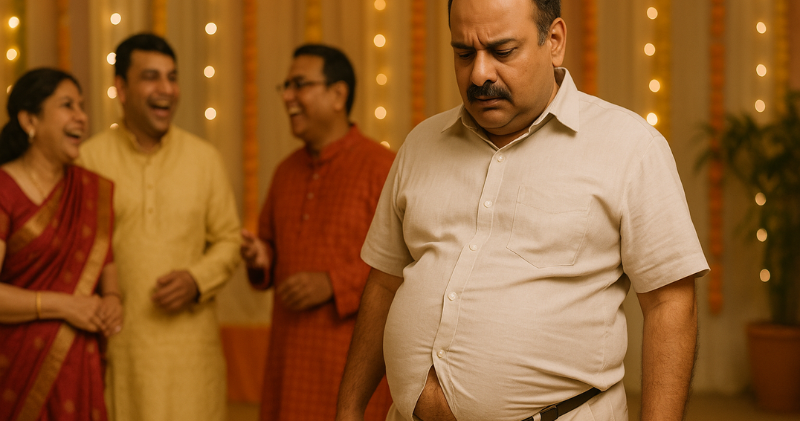The Belly Without the Bottle
Imagine a man in his early 50s, belly out, shirt riding up slightly at a family wedding. Someone chuckles, “Looks like he’s had too much Kingfisher!” But here’s the thing — he rarely drinks.
So where did the belly come from?
Welcome to the world of the “Desi Pouch” — a round, firm belly that’s common in South Asian men and women, often without the beer. It’s not just about overindulgence — it’s the result of a perfect storm of cultural habits, diet, stress, and genes.
And yes, it’s a serious red flag for heart disease.
What’s Really in That Belly?
That pouch you see isn’t just harmless padding. Most often, it’s visceral fat — a type of fat stored deep inside the abdomen, wrapped around your liver, pancreas, and intestines.
Unlike fat you can pinch on your arms or thighs, visceral fat:
- Increases inflammation in the body
- Raises blood pressure and bad cholesterol
- Triggers insulin resistance
- Hardens arteries — even in people with normal cholesterol levels
In simple terms: it’s the kind of fat that leads to heart attacks, diabetes, and strokes — and it grows silently over years.
So If It’s Not Beer… What Causes It?
Rice 3x a Day? Your Body Can’t Keep Up
Rice is a staple in Indian, Pakistani, and Bangladeshi households — especially white rice. But large portions, multiple times a day, lead to glucose spikes and fat storage, especially when not balanced with vegetables or protein.
Sugar in Everything
From chai to laddoos to ketchup — sugar is hiding everywhere. Two teaspoons in morning tea, a biscuit or two in the afternoon, dessert after dinner… It adds up fast. This fuels belly fat even in people who don’t overeat.
Chronic Stress
Your body isn’t just affected by what you eat. When you’re constantly stressed — job tension, family worries, financial pressure — your brain tells your body to release cortisol. This hormone signals your body to store fat around your belly for “safety.” That’s an ancient survival mechanism that backfires in modern life.
Lack of Movement
Sedentary desk jobs, sitting in traffic, and little structured exercise mean excess calories aren’t burned — they’re stored. South Asians have some of the lowest physical activity rates globally.
Genetics
Even if you eat the same diet as someone from another culture, your body may store more fat internally. South Asians tend to develop metabolic syndrome at younger ages and lower BMIs than other groups.
Signs That the ‘Desi Pouch’ Is a Red Flag
Don’t wait for symptoms. If you notice these signs, take action:
- You can’t see your feet when standing straight
- Your belly sticks out while the rest of your body is lean
- Your pants feel tighter around the waist but loose at the thighs
- You feel bloated or sluggish after eating carb-heavy meals
Most importantly — if your waist size is over 90 cm (35.4 in) for men or 80 cm (31.5 in) for women, that’s a sign of increased risk.
3 Things You Can Do to Shrink the Pouch
This isn’t about six-pack abs. It’s about a safer heart, lower blood pressure, and avoiding a future heart attack. Start here:
- Rebuild Your Plate (Still Keep the Flavors):
- Halve your rice and replace it with sautéed vegetables or dal
- Add 1–2 boiled eggs, tofu, or grilled paneer for protein
- Cut sugar in chai to 1 tsp or switch to jaggery
- Move More, Sit Less:
- 15-minute walk after dinner = magic for glucose control
- Stand up every 30 minutes at work or while watching TV
- Do light housework, stretch, dance — anything is better than sitting
- Fix Your Sleep & Stress:
- Aim for 7–8 hours of restful sleep
- Set a sleep schedule and avoid phone scrolling before bed
- Practice 5 minutes of slow breathing or prayer to reduce stress
Your belly isn’t just physical — it’s emotional too.
Bonus: Ask for These Health Tests
If you’re serious about prevention, talk to your doctor about:
- Fasting insulin (better than just blood sugar)
- Liver enzymes
- Calcium Score CT scan to detect early heart blockages
- Lp(a) blood test for genetic heart risk
These are especially useful if you have a family history of heart disease.
Final Takeaway
That firm, rounded belly isn’t just “middle age catching up.” It’s your body raising a red flag — and it’s doing it early. South Asians often get heart disease 10 years earlier than others. But that doesn’t mean it’s your fate.
Change your plate. Move your body. Give your heart a little attention today — so it doesn’t demand it in a hospital tomorrow.




